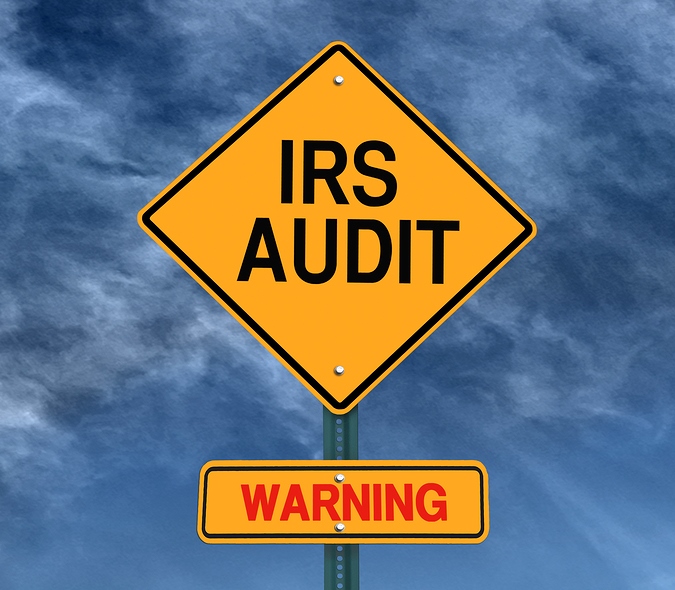Learn the IRS Red Flags That Can Trigger an Audit
Mar 01, 2017

What triggers an IRS tax audit?
While the IRS isn’t about to publish a list of items that cause an audit red flag, there are a number of items that are known to raise the IRS’s interest in a tax return.
What are your chances of being audited? For individuals, it depends on your income. In fiscal year 2013, returns reporting income of under $200,000 stood a 0.88 percent chance of an audit. Those with incomes of $200,000 and more had a 3.26 percent chance. And if your income was $1 million or more, you had a 10.85 percent chance. While audit rates were generally down in 2013 from the previous couple of years, they’re still much higher than in earlier years.
In addition to income, it’s the entries on your return that are likely to flag it. What items are likely to trigger a letter from the IRS? Here’s a list of items some tax preparers believe trigger an audit. Some items only apply to individuals or individuals who file a Schedule C, while others apply to both individuals and businesses. In some cases, items are likely to only generate a letter from the IRS requesting documentation for the item.
Individual Audit Triggers
1. Over-sized charitable contributions. The IRS publishes data on the average size of charitable contributions for various income levels. If you take a deduction for an amount that is materially larger than the averages, you could get a letter.
2. Large property contributions. Significant charitable contributions of property require an appraisal and certain return attachments. Appraisals are often challenged by the IRS.
3. Unmatched alimony. If you take a deduction for $24,000 of alimony, your ex-spouse should be reporting $24,000 of income.
4. High mortgage interest. The maximum amount of qualified home indebtedness is $1.1 million (including home equity loan). A mortgage interest deduction that’s in excess of a certain percentage of the debt limit could indicate an excessive deduction.
5. Unreported income. Failure to report gambling winnings, interest and dividends, non-employee compensation (1099-MISC), K-1 items, etc. may just trigger a letter and bill from the IRS — or it could generate an audit.
6. Gambling losses. You’re allowed to deduct losses on Schedule A up to the amount of your winnings. But the IRS knows that many taxpayers don’t keep the required records.
7. Miscellaneous itemized deductions. Breaking the 2 percent of adjusted gross income threshold is difficult, so large miscellaneous itemized deductions may perk the interest of the IRS.
8. Foreign bank accounts. Checking the box indicating that you have a foreign bank account on Schedule B could increase your chances of an audit. But not checking the box, when you should, could too. The IRS continues to get information on many foreign bank accounts.
9. Unreimbursed employee business expenses. These expenses may be deductible, but substantial amounts are likely to raise questions because they are frequently reimbursed by an employer. If the expenses involve travel and entertainment or auto usage, your chances of hearing from the IRS may increase further.
10. Cash transactions. Banks and merchants are required to report cash transactions in excess of $10,000. If you have a business, the IRS may want to know where you got cash.
11. Rental losses of a real estate professional. A qualifying individual can deduct rental losses in excess of the usual $25,000 limit. Meeting the required time involved in real estate activities and substantiating it isn’t easy. Checking the box on Schedule E could increase your audit chances.
12. Casualty losses. This can be a complicated area where appraisals and other outside information may be required.
13. Bad debt losses. Again, this is often a complex area. Many taxpayers lose on this issue because they can’t show a bona fide debt existed or that a loss occurred in an earlier or later year.
14. Home office. If you use a portion of your home exclusively for your business, you can deduct the expenses and depreciation associated with the space. But you’ve got to show the business connection and that the space was used exclusively for business. Both can be challenged by the IRS. The tax agency can also question the expenses involved in a home office. There’s plenty of opportunity for an IRS auditor to make adjustments. In general, the higher the percentage of the home claimed for business, the greater your audit chances.
15. Day-trading losses. Claiming to be a day trader and taking losses on Schedule C is a red flag.
16. Net operating loss. If your business (sole proprietorship, S corporation, partnership) has losses you may have an NOL (net operating loss) that can be carried back or forward to offset income in other years. You may be asked to substantiate the loss if you claim a refund for an earlier year or on a later return where the NOL is used.
17. Rental losses. These could be challenged if there’s no revenue from the property.
18. Hobby losses. Multi-year losses on Schedule C (or a pass-through entity such as an S corporation) may be scrutinized, particularly if the business is listed as one that has elements of personal pleasure such as horse breeding, photography or auto racing. Your audit chances increase if the losses offset substantial other income on the return.
Business Audit Triggers
If you file a business return such as a Schedule C, S corporation or LLC, there are other triggers. These triggers may also apply to rental properties.
19. Travel and entertainment. Because of the record keeping requirements, and the fact that some deductions can be questionable, this is always a ripe area for the IRS.
20. Auto usage. Again, the IRS is well aware that many taxpayers fail to keep the required records, making it a fruitful area for an IRS adjustment during an audit.
21. Repairs and maintenance. What property owners believe is a repair and what the tax law considers a repair is often different. The IRS may require you to capitalize and depreciate expenses that you deducted.
22. Zero officer salaries for an S corporation. If an S corporation is active, showing no salary for officers is a red flag.
What should you do? It doesn’t make sense to not take a deduction you’re entitled to, such as for a home office. Just make sure you’re entitled to the deduction and have the required records and tax law justification to back it up. For example, if you’re not sure if the part business/part personal trip is deductible, give your tax adviser the facts and get a professional opinion.
In terms of an IRS audit, larger businesses may have to undergo detailed examinations involving many issues, but for individual taxpayers and Schedule C filers, audits may be limited to selected items — unless those items indicate problems.
Copyright © 2017
Sign Up for Email Updates
Accounting & Financial News

Favorable Business Depreciation Tax Changes Under New Law
There's good news for businesses considering buying equipment and other capital assets: The One Big Beautiful Bill…

The OBBBA: What It Means For Nonprofits
On July 4, 2025, President Trump signed the One, Big, Beautiful Bill Act (OBBBA), which contains several…




